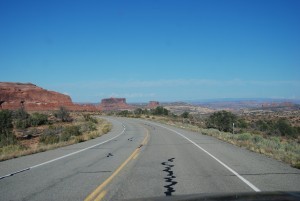Rolf Potts's Blog, page 100
April 7, 2012
Vagabonding Field Reports: Dadanawa Cattle Ranch, Guyana, South America
Vagablogging :: Rolf Potts Vagabonding Blog

Savannah Sunset from the top of Towa Towan - Kanuku Mountains - Photo by Kris Arndt
Cost/day: $0.8/day
Guyana isn't really that cheap. However, if you're creative and have some skills, anything is possible. I worked at Dadanawa Cattle Ranch for two and a half months in exchange for food and board. Most of my money went towards toiletries, insect repellant and beer. Being frugal was easy because the nearest town was 4 hours drive over rough savannah roads away.
What's the strangest thing you've seen lately?
" GET OUT OF MY GARDEN" yelled Dani. A chicken was destroying the shallots and was being nonchalant about it too. Duane Defreitas, ranch manager and adventurer, shot at it from the balcony with a Ruger 22 handgun. "Oh scunt!" Winged it. Chung, a Chinese anthropologist, chased after the feathered fugitive with a machete.Duane's grandchildren, shrieking havoc, joined the chase. The chicken swerved, the anthropologist threw the machete at it, missed. The kids ran it down and I found a solitary claw at the bottom of the lunch pot while a monkey wrestled a kitten under the kitchen table.

Dadanawa Cattle Ranch, Guyana, South America - Photo by Kris Arndt
Describe a typical day:
4.30am: Get woken up by cockerels and by Foghorn. Foghorn is the name I gave a calf tied up between my house and the slaughterhouse. He has a disproportionately loud moo to body mass ratio. Light a candle and have a cold shower. Say "Hi" to the Amerindian family living downstairs. Go over to the main house and make breakfast – eggs, home smoked pork or homemade pastrami, toast, and homemade jam – with Duane who is an insomniac sudoku player. Listen to BBC Radio 4 World Service and play with Monks a golden-handed tamarin and house pet.
5.30am: Head out in the 4×4 or on trail bikes armed with a cutlas (machete), a handgun and a shotgun for protection. I don't really like guns and haven't much experience of them but if that's all that lies between me and getting eaten by pumas then I tend not to object. Ride through the savannah as the sun rises looking for fresh animal tracks. (The other week a mother jaguar and two cubs had crossed the road about an hour before us.)
6.30 – 10.30am: Go to a gallery forest at the base of Darakuban mountain, in the Kanuku Mountain Range, and wade through a creek looking for animals, tracks and the best place to put camera traps. Try to avoid surprise encounters with caiman, anaconda and other deadly and venomous animals, reptiles and insects. Camera traps use motion sensors to trigger when something passes by them and are left in the same position for a period of time. They give a good idea of what animals are in the vicinity for conservation research, tourism or curiosity. We have caught a variety on cameras including, jaguar, ocelot, capybara, agouti, labba, armadillo and tapir.
Head back to the ranch.

Jaguar track found about 5 minutes walk from the corral and the ranch buildings - Photo by Kris Arndt
11.30am: Have lunch with everyone. Normally farine (little yellow rocks made of cassava) and tasso (dried beef made on the ranch) with curry or stew.
12.00pm: Everyone goes for a sleep during the hottest part of the day.
13.00: Go back to the main house and do some work on the internet with Monkey sitting on my lap and Spider Cat (a kitten) clawing his way up my leg. There is no electricity on the ranch and no mainline telephone. They do have a generator which works occasionally and solar panels which power the internet and a light.
15.00pm: Go to the corral to take pictures of the vaqueros (barefooted amerindian cowboys) branding, castrating and riding wild cattle. Join in the fun.
16.30pm: Do some writing while sitting in my hammock and looking out over the savannah and the Kanuku Mountains. Fantasize about ice cream and other dairy products. Consider risking life to milk a wild cow. Give up on the idea. Continue writing.
5.30pm: Go for a run, barefooted, with Evi, a Biologist doing research on jaguars for Panthera. Check for animal tracks on the way and stop at the river crossing to look for water snakes, caiman and any other wildlife that may be lurking about at dusk. Run back to the ranch and do some yoga while night rolls in.
19.00 – Variable: Go to the main house and have dinner (usually soup) and 'gaff' with Duane and everyone else by candlelight while drinking copious amounts of El Dorado rum with water. This usually leads to absurd and inappropriate conversations.
Describe an interesting conversation you had with a local:
Guyana is still 80% rainforest the majority of which is pristine and has a population of less than 1million inhabitants, most of whom are in the north on the coast. There are many conservation projects going on but there is also a lot of mining and many young people leave the ranches and villages for the gold bush causing quite a few social and economic problems. Alison is a Wapisiana amerindian who is living and working on the ranch. She's originally from Sand Creek, one of the 11 amerindian villages in South Rupununi. I was chatting to her about the gold bush. Wages in Rupununi are very low, Alison calls hers "Tips". For that reason and because she has two kids to feed she went to work in the gold bush as a cook in a gold mining camp. She can earn much more money there though it's difficult and dangerous. She told me her friend contracted typhoid, dengue fever and malaria at the same time though, miraculously, survived. Apart from disease she also had to look out for snakes and insects. She said that women can earn money providing "extra services" for the men but she didn't want to do that. There is also a lot of robbery and other crime in the bush.
What do you like about where you are? Dislike?
I love the freedom. If you want to spend a day lying in a hammock, you can. If you want to go heard some cows, that's ok. If you want to go out and roam the savannah for a bit or go swimming in the river, also ok.
I love the location: It's one of the most remote ranches in the world set in 1750 square miles of savannah, mountains and forest, it's stunning. It is also incredibly bio-diverse.
I don't much care for the lack of privacy. Though the ranch is huge the compound is not. It's a very small community and consequently every knows exactly what everyone else is doing at all times. Part of that is for safety reasons as it's four hours away from the nearest hospital and there are a lot of things around which could hurt you and partly it may be a need for entertainment due to a lack of television, but that's just a guess.
Describe a challenge you faced:
Living in a small community with little privacy in an area where it's so remote you are dependent on others to get away can sometimes lead to a bit of stir crazyness. It's being an outsider and coming into a situation where you are vulnerable and have no idea what has been happening before your arrival and probably not even after your arrival either.
What new lesson did you learn?
As regards the above. I think I learned that, in a small community, you can't just walk away and leave things unsaid. You have to confront them as they happen or they get worse and the situation doesn't get resolved which makes things difficult for everyone. This is a lot easier said than done and of course it may not work but at least then you know you have done everything you can.
Where next?
Boat-hitchiking around the Caribbean, starting in Barbados then going to Bequia (St.Vincent and the Grenadines) for the Easter Regatta then making my way up the islands somewhere around the Puerto Rico area. Or something like that. Anything could happen.
If you would like to read the full account of life on the ranch please visit my blog: The Absurd Traveler's Guide.
Until next time,
Kris

Duane Defrietas at Catilernau - Ranch Outstation - Photo by Kris Arndt
Original article can be found here: Vagabonding Field Reports: Dadanawa Cattle Ranch, Guyana, South America
Special April 2012 fares for multi-stop tickets on BootsnAll
Vagablogging :: Rolf Potts Vagabonding Blog
Over at BootsnAll, we like to promote long-term, RTW travel. We hope to inspire others to make their travel dreams come true and take a trip around the world. But a recent article challenged the thought that everyone wants to take a round the world trip.
The author posed an interesting question, "Is RTW travel for everyone?" In this article, she talks about how she doesn't really want to take a RTW trip and has become an expat instead. She discusses the reasons behind not wanting to travel RTW, and points out the advantages of living abroad instead.
It's an interesting thought that honestly created a lot of discussion and debate within our company. Is expat living a viable alternative to long-term, RTW travel? A commenter asked if the author should dismiss round the world travel if she's never done it before.
What do you think? Is RTW travel for everyone? Can one dismiss an entire genre of travel if he or she has never done it? How do you know what you will or won't like if you've never tried it before? Comment below to share your opinions.
If you do decide to throw caution to the wind and travel the world, the first thing you'll want to look at is airfare. Your options are many, but be sure to keep your eye on different deals around the web. BootsnAll has monthly deals that can take you all over the world, so be sure to check out the following deals, which are good through April 30, 2012:
RTW FTW -Chicago – Sydney – Bali (Denpasar) – OVERLAND – Jakarta – Singapore – OVERLAND – Kuala Lumpur – Rangoon / Yangon – Bangkok – Delhi – OVERLAND – Bombay / Mumbai – Johannesburg – Buenos Aires – Montevideo – Rio de Janeiro – Lima – Bogota – New York – Chicago from $5249 plus taxes.
Circle the Pacific – Seattle – Sydney – Singapore – Shanghai – Beijing – Seattle from $2599 plus taxes.
India, Egypt, Africa, Europe – New York – Delhi – OVERLAND – Bombay / Mumbai – Cairo – Nairobi – London – New York from $2549 plus taxes.
If you are looking for something a little different in your round the world trip, then start planning your trip of a lifetime with our RTW trip planner And don't forget to sign up for BootsnAll's RTW newsletter, delivering special deals, RTW trip planning advice, and resources via email every single month. We also have a Facebook fan page and Twitter page, so be sure to like and follow those to keep up to date on all your RTW travel needs.
Original article can be found here: Special April 2012 fares for multi-stop tickets on BootsnAll
April 5, 2012
Managing time on the road as a travel writer
Vagablogging :: Rolf Potts Vagabonding Blog
The essence of travel writing resides in the stories we live on the road: from the narratives of greats such as Chatwin, Theroux, Darlymple and others, to the tiny weblogs of your latest holidays, we are surrounded by more travel literature than what we can possibly consume. Some of it provides outstanding quality and catches a still literary photography of cultures, times and moments; other presents less vivid accounts of a person's daily activities, a more monotonous list of facts and places.
Besides its quality, one thing is actually clear about travel literature: like most writing, it is more time consuming than reading. And it may be more easily done from your apartment, after returning from your trip, than from the road.
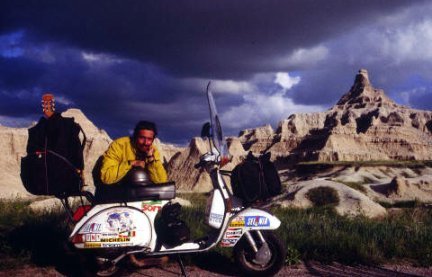
Italian travel writer Giorgio Bettinelli (Picture credit: www.twowheelsblog.com )
Sparing an hour or two per day for some literary production is definitely more feasible than finding time from a busy schedule of train departures, sightseeing, meetings with local friends. Italian travel writer Giorgio Bettinelli – may you rest in peace, my friend – , a man who travelled the world on a Vespa scooter for 14 years and visited more than 150 countries, confessed me that he never wrote as he travelled. Too much time sitting on the motorbike, too much stress, and the very few moments of pure concentration could only spoil his creative stream. He preferred to return to Taiwan or China where he resided with his wife, kick back and type away many hours per day for two to three months, and then set off again for the next adventure.
Unfortunately for most of us, unlike Giorgio, we do not have a publisher anticipating book royalties, and we have to struggle with writing assignments to survive. Freelance writing, an already poorly paid activity, becomes very difficult to manage as we cross borders and move along the world's maps. Personally, as I am travelling hard this year, I have found it quite exhausting to return from 7 hours day hikes and find myself forced to progress with my writing. Like a good schoolboy, I type away until my eyes collapse, and sometimes I wake up in the middle of the night with the laptop's led blinking at my sleepy face.
Travelling and writing, as two antithetical activities, require time and dedication spent pursuing a final goal: discovery, and creation. As much as an expatriate can manage writing time into an organized weekly schedule – because let's face it, being an expatriate can be enlightening, but it is still very far from the joy and freedom of reckless travel! -, a travel writer may have a problem jotting down his best lines as he moves across the globe.
A laptop is definitely a great tool to pursue this activity, but it generally works best when the writer stays in a place longer, and has less time or drive to discover. In my case, as I greatly enjoy exploring and the outdoors, I find myself more on the field than at the coffee table typing. The time spent riding buses or the train is sometimes not productive due to the extreme bumpy conditions of my favorite Asian roads, or the continuous opportunities to meet new local friends and indulge into conversation…
How do you manage your writing on the road, being it travel related or not? Do you prefer to keep a daily schedule, or do you take notes and write when you return at home?
I think this is an interesting topic; especially poignant as I was good enough to type this article during a bumpy bus ride, crossing the Bardia National Park in Western Nepal… for this time, I am giving a good "dedicated travel writing" example 
Original article can be found here: Managing time on the road as a travel writer
Road trips
Vagablogging :: Rolf Potts Vagabonding Blog
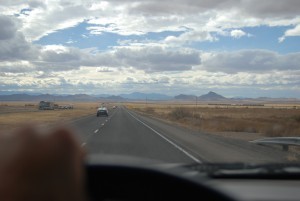 A decade ago gas was 98 cents a gallon. I took a three month sabbatical from my job, rolled down the windows, cranked up the song "Life is a Highway" and with my dog riding shot gun, hit the open road. "Do it while your young." people kept saying me. I skipped stones into the surf of the Pacific, climbed around cliff dwellings in New Mexico and rescued my dog from nearly drowning in a Montana river. Twenty-five states and 30,200 km (18,800 mi) later we arrived back home with a wrinkled road map, a journal full of adventures and a problem; there were many more roads to explore.
A decade ago gas was 98 cents a gallon. I took a three month sabbatical from my job, rolled down the windows, cranked up the song "Life is a Highway" and with my dog riding shot gun, hit the open road. "Do it while your young." people kept saying me. I skipped stones into the surf of the Pacific, climbed around cliff dwellings in New Mexico and rescued my dog from nearly drowning in a Montana river. Twenty-five states and 30,200 km (18,800 mi) later we arrived back home with a wrinkled road map, a journal full of adventures and a problem; there were many more roads to explore.
America claims to have one of the largest highway systems in the world. But, the first recorded long distance road trip took place in 1888 with Bertha Benz at the wheel. She and her two teenage sons drove 212 km (132mi) round trip in Germany. To commemorate the 125th anniversary of that trip the Bertha-Benz challenge took place along the historic route. It was only open to cars with alternative drive systems, highlighting the auto mobility of the future.
For me that first trip was only the beginning. I've meandered through 49 U.S. States and two territories in Canada. In the next few months I've got two more road trips planned. Granted, fuel prices are at an all-time high; but, there are ways to save money on gas. Road trips are a wonderful way to experience a country.
Have you ever taken a long distance road trip?
Original article can be found here: Road trips
April 4, 2012
Vagablogging Field Reporters
Vagablogging :: Rolf Potts Vagabonding Blog
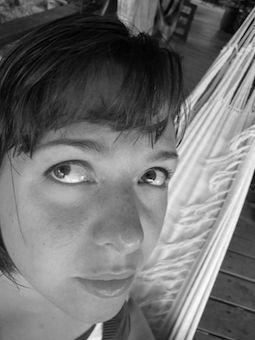
Kris Arndt has German parents but managed to be born and grow up a bit wild in rural Ireland followed by moving to the UK. After that convention wasn't too appealing and a riot of opera singing, painting, philosophizing, extreme reading, sailing, managing cocktail bars, composing and riding motorbikes crash landed into the ideas encompassed by Camus and Kerouac to produce the vagabond she is today. Singing for the president of Kazakhstan was nice, hiking through the Atlas Mountains with Berber tribes people was enlightening, hitchhiking alone across Patagonia was slightly scary, working as a cowgirl deep in the Guyanese interior was humbling, but adventure is in the soul and can't be quenched so easily. So with nothing but a computer to write on and a hole in her pocket she has convinced herself to make her way up from South America to Canada and then hop on a boat to Russia and beyond for a life of adventure, working while on the road, traveling indefinitely and uncertainty. You can find the full account of her adventures here.

Travis Bickham is a recent graduate of the University of California, Berkeley where he lettered in water polo, winning a national championship in 2007, and wrote for The Daily Californian. He is an avid vagabonder and currently on a 3-month tour of Europe. A passion for culture and adventure drive this ex-athlete outdoorsman to both exotic capitals and remote mountaintops. The only thing that really matters is the journey itself and the people you meet. Follow Travis at travelsofastoic.com.
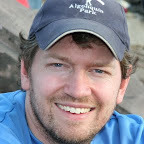
Peter Cresswell came about vagabonding in classic fashion: traveling through India with a copy of Rolf Potts' Vagabonding tucked firmly in his backpack. A couple of years after the initial seeds were planted, he quit his job as a manager at a medical software firm in Toronto, Canada, and together with his wife ventured forth on a year-long, round-the-world trip starting in November 2011. An incurable technophile, Peter loves exploring the intersection of travel and technology and finding new ways of sharing his travel experiences with others. When not traveling, you're likely to find Peter on a rink enjoying that ultimate Canuck game – hockey. You can read about Peter's latest adventures on his travel blog, Always Twirling, or on twitter @always_twirling.

Growing up relatively isolated from the rest of the world in Perth, Australia, Ash Jordan dreamed of travelling abroad. After starting veterinary school he worked three jobs in order to pay for a six week trip to Thailand and Vietnam. This fuelled a desire for more time overseas and upon graduating he moved to northern California, where he has been living and working with dogs, cats and their people for the past four years. Now, having saved up enough money, he plans to vagabond through the America's for several months. He is fond of indy rock bands, the great outdoors and adventure travel. He does not like rats. Rats are nasty. His email is ash.g.jordan [at] gmail.com

Chris Plough is an entrepreneur who rediscovered his passion for travel while he (unintentionally) destroyed an ambulance on a trek from the UK to Mongolia. Since then, he has embraced the vagabonding lifestyle and enjoys finding the balance between travel and his love for startups. He also writes on his blog, sharing his experience in achieving happiness through entrepreneurship and adventure.

Claudio Secci began vagabonding in Milan, Italy at the age of 3, when his favourite game was tying up his possession in a bundle and leave home for a new adventure. When his mom locked him out for few very long minutes, she managed to keep him at bay for some years. The travel bug grew mostly quietly, except some flashes like when at the age of 17 he traveled alone around Europe for a month. He started a real vagabond life on a December 2003, while bored working at home as a community manager for an italian sport website. Since then he didn't stop, not even after seven years his dream job was gone. In the last 10 years he has explored 63 countries and has worked as a Massage therapist and Yoga teacher. On September 3, the same day Amelie Poulain was conceived, he turned 40 and asked himself: 40andnow? It looked like a good idea to finally open a personal blog. And now he keep obsessively ask himself what he is going to do next. Apart keep travelling, of course.

Konrad Waliszewski is a vagabonding entrepreneur who is currently serving his business and clients remotely while traveling the world and working with local businesses, investors and philanthropic organizations along the way. He seeks to work in each country he visits in order to gain a better understanding of the country, people and culture and because he believes that creating sustainable economic opportunities for people is one of the best ways to fight poverty, promote peace and advance any society. As a full-time traveler, explorer and businessman, he carries a mobile office in his backpack and frequently sets up shop in a hostel, café, mountain top or ancient ruin. You can learn more about him and follow his blog at www.worldventureproject.com. He can also be reached at konrad [at] worldventureproject.com.

Victoria Watts is on a quest. She and her boyfriend Steve packed up their home in London in February 2012 and left for south America. They're not sure where they're going or how long they'll be gone for but they hope to find their way. Before this adventure, Victoria worked as a writer for the British Red Cross in London. Nowadays, she writes for a beautiful magazine called Oh Comely, and runs her own blogs If I had a Superpower and Bridges and Balloons. She's been travelling since the womb and is a massive fan of of couchsurfing, cakes and Jungle Speed.
Original article can be found here: Vagablogging Field Reporters
Introducing a new series : Vagabonding Field Reports
Vagablogging :: Rolf Potts Vagabonding Blog
We here at Vagabonding hope that everyone is enjoying our exciting new crop of regular contributors!
Whether it's traveling with children, starting off on a first adventure, or learning how to make a living with a guitar, we're showing that anyone can break the mold. As I to alluded back in January, we've got more in store for our growing community of long-term travelers.
Starting this Saturday, we will be introducing a new series of currently traveling vagabonders, sharing their current experiences out and about in the world. Through their Field Reports, you'll find out what the cost of living is in Argentina, the weirdest thing seen in Paris, or what a typical day in Thailand might be like.
In addition to our excellent regular weekly contributors, we hope that our Field Reports will inspire, educate, and reassure anyone thinking about taking a long break from a routine life to explore their world. This new series will run twice every Saturday!
Please give them a great big welcome in the weeks to come!
Original article can be found here: Introducing a new series : Vagabonding Field Reports
April 3, 2012
Paris in Bangkok: You never quite find what you dreamed!
Vagablogging :: Rolf Potts Vagabonding Blog
Gone are the days where Thailand is all Thai and France is all French. Thanks to human migration and globalization, there's a bit of Bangkok in Paris and a slice of Paris in Bangkok. 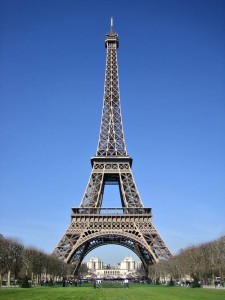
As my seventh month of travel approaches an end, I realize that I've learned just as much about other countries than I have about those I've visited. Moreover, I've gained a clearer perspective of America through non-American eyes than I ever gained in high school and college History classes. I am reminded that travel is as much about unexpected fun with the people you meet than about where you happen to be in the world.
Heading to Chile? One of your favorite experiences might involve German trivia night at a Munich style pub. Exploring London? Your best and most memorable meal may be a simple plate of dahl and dosa in Little India. Wherever you're headed, be prepared for unexpected highlights that go beyond traditional guide book assumptions about the place you happen to be visiting.
So here I am, in the bustling Southeast Asian metropolis experiencing my first taste of Paris. I'll get there eventually, but for now this taste of the city of lights will do just fine.
So, tired of Thai street coffee, I stumble into Cafe Tartine in central Bangkok for a latte and croissant. The prices are unfortunately more French than Thai, but I treat myself on occasion in an effort to prevent backpacking fatigue.
This particular Parisian enclave is abuzz with French conversation and Edith Piaf songs, and my brian desperately works to recall my year of college French class. I learn quickly that new French mothers meet at this patisserie on Wednesdays, arriving every week with their infants to speak in their native tongue over quiche and cappuccinos. I look around the room at the eclectic mix of Europeans and fresh croissants and wonder..where am I?
France in Thailand
I head up the Bangkok BTS stairs to board the train, and spot a poster advertising this year's French Thai Cultural Festival, a celebration of the Alliance francaise centennial in Bangkok. It's a visual showcase, celebrating 20th century France through theater, visual arts and cinema. After my breakfast experience, I find it fitting to head to the Bangkok Arts & Culture Center and check it out.One of the many perks of long term travel is the ability to break free from the confines of a schedule – to simply go with the flow of the day and embrace whatever spur of the moment idea seems right at the time. In my case, this Wednesday turned into a quick metaphorical trip overseas.
I meet a few university students at the exhibit who tell me what they know about the artists and remind me that thousands of French students, expats, artists, and families live in Bangkok. I join them for red wine and Thai food and learn more about Paris, not Bangkok, in that dinner without even stepping on French soil.
"The reason vagabonding is so addictive is that, joyfully, you'll never quite find what you dreamed."
Original article can be found here: Paris in Bangkok: You never quite find what you dreamed!
What materials are needed to roadschool?
Vagablogging :: Rolf Potts Vagabonding Blog
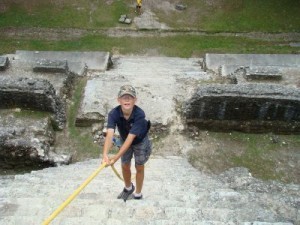
Learning comes naturally when you're there. Climbing a Mayan temple at Lamanai ruins in Belize.
Education is a huge concern to parents, as it should be. When we travel long term, it can be even more of a concern. Will your travels handicap your child? Will he keep up with his peers? Is this travel idea a good one?
As a long-time schoolteacher and roadschooling mom for four years, I can say with absolute certainty that you needn't worry. Your child will do just fine. And no, you don't need to haul a classroom around the world with you.
As roadschoolers, you'll have the advantage of being in unique locations and you'll be able to take advantage of that fact. When you visit national parks, take time to listen to the ranger talks and read the info presented in the visitor centers. As you drive along the highway, stop and read the historical markers. You will find that a huge amount of your children's education can come from simply taking advantage of your local environment – wherever that happens to be today.
There are some materials that will make your life easier on the road. Each family will choose different items, but this is what we carried with us on our bicycles as we traveled the world on two wheels:
Kindles – the best purchase ever. Our sons could download English books no matter where we happened to be.
Math books – For younger children, all they need to know in this area can easily be incorporated into your daily routine, but for older kids who are studying more advanced math, it's not as easy. We managed to get some math books from a school that had purchased new ones and was discarding their old copies.
Notebook – We carried a notebook for each child. They used them as journals if we were camping out and they didn't have access to a computer, and as paper for math. We bought small notebooks and replaced them when full.
Calculator/Thesaurus/Dictionary/Translator – One machine did it all. It was the size of a normal calculator, but was so much more.
Maps – We carried maps so we knew where we were going, but they also made great teaching materials.
Computers and various CDs - A computer is a great tool! We had a wide variety of educational programs for our children – from an entire earth science book that had been scanned to geography programs to math drill. There is no end to what you can find for the computer.
Creativity – This is the most important thing to take with you! By thinking creatively, you will find you can provide an awesome educational program for your children no matter where you happen to be in the world!
Original article can be found here: What materials are needed to roadschool?
April 2, 2012
Street photography tips and tricks
Vagablogging :: Rolf Potts Vagabonding Blog
When you look back at photos of your travels, do you find yourself quickly flipping past the famous landmarks to the smaller, intimate moments? That's what street photography is all about, capturing those slices of life.
The team at DigitalRev TV produced a video titled Street Photography Do's and Don'ts. DigitalRev is a Hong Kong-based photography site. They run an active YouTube channel that has camera reviews, lens reviews, and comparisons of popular DSLRs. The host, Kai, has a sense of humor (e.g. at 7:31 he says "That's me in 50 years"). The videos are fun to watch, if only to explore Hong Kong vicariously. For any pixel-peepers, every photo Kai takes has the f-stop, ISO and related details in the lower right corner of the screen.
Some of Kai's tips:
Turn off auto-focus assist lamp, beeps and flash.
Use a 50mm prime lens. This works better on DSLRs with full-frame sensors. Entry-level DSLRs have cropped sensors, so a wider focal length like 35mm or 28mm would be more suitable.
Get close to your subjects.
Some of my best people-watching photos have been in Malaysia, due to its colorful mix of Malay, Chinese and Indian population. A fair amount of Malays and Indians wore traditional clothing, which was naturally eye-catching. I probably took more photos of people than buildings.
Do you like to do street photography? What were some of the most memorable pictures you've taken? Where are your favorite places for taking pictures? Please share your stories in the comments.
Original article can be found here: Street photography tips and tricks
Tourists use different strategies (for dealing with the fact that they're tourists)
Vagablogging :: Rolf Potts Vagabonding Blog
"Unlike anti-tourists, elite tourists don't have to worry about those other tourists. They have always been able to pay for privacy and exclusivity. The anti-tourists have a more difficult position, because they belong to the category of tourists who crave a chance to experience the unspoiled, the unexploited, and for them it is crucial to be off the beaten tourist track. Thus their irritation at finding their favorite haunts swamped by other visitors is understandable. Then there is a third and new category, called the "post-tourists," who may be defined as reformed anti-tourists, who have resigned their project and decided to join in with those other tourists, but always with an ironic distance. Let's have fun at Disneyland, anyway, even though we know it's a total fake! But what about all those other tourists? They sometimes become specimens of Turistus vulgaris. As their function is that of Othering, they are a symbolic mass, constantly changing color, form and content. As mass tourism develops, the middle-class stance of the anti-tourist becomes a more common strategy, and it continues to single out the symbol of the vulgar tourist… Turistus vulgaris is an animal that never sleeps alone: T. vulgaris appears in herds, flocks, droves, packs, or swarms. In lumps and clumps, they follow the guides from sight to sight, and they descend on villages or swamp the art museums."
–Orvar Lofgren, On Holiday: A History of Vacationing (1999)
(1999)
Original article can be found here: Tourists use different strategies (for dealing with the fact that they're tourists)
Rolf Potts's Blog
- Rolf Potts's profile
- 323 followers


